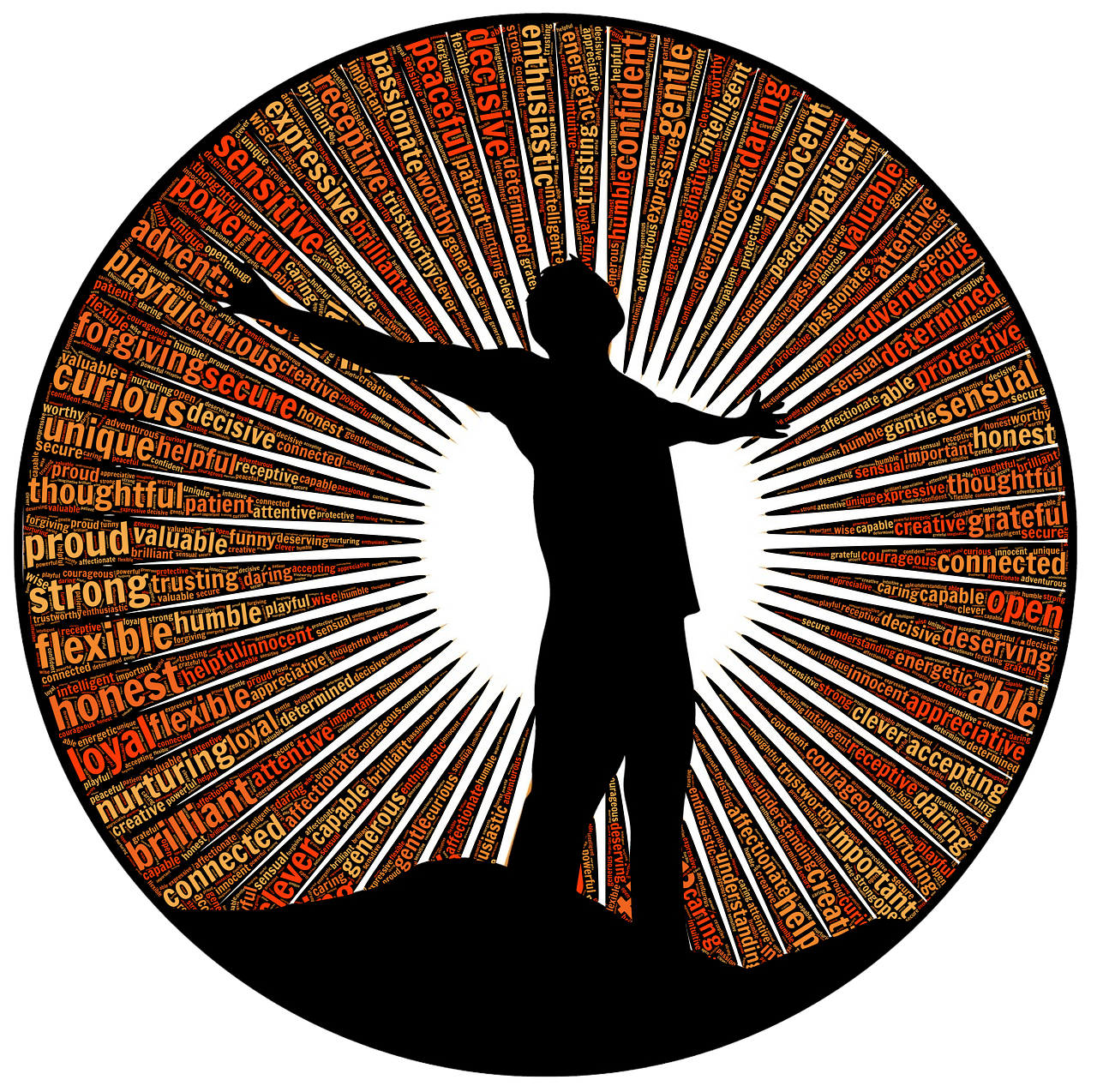
Click below to listen to this article:
Wholeness
Personal wholeness is a concept that has been explored by various disciplines, such as psychology, philosophy, spirituality, and art. It refers to the state of being complete, integrated, and harmonious within oneself and with the environment. Personal wholeness can be seen as a goal, a process, or a quality of life that enhances one’s wellbeing, creativity, and authenticity. In this article, we will examine the different aspects of personal wholeness, such as its definition, dimensions, benefits, challenges, and strategies. We will also discuss some examples of personal wholeness in practice and provide some tips on how to cultivate it in our daily lives.
What is wholeness?
“Wholeness is not achieved by cutting off a portion of one’s being, but by integration of the contraries.” – Carl Jung
“The most terrifying thing is to accept oneself completely.” – C.G. Jung
“The privilege of a lifetime is to become who you truly are.” – C.G. Jung
“You are not a drop in the ocean. You are the entire ocean in a drop.” – Rumi
“The journey to wholeness requires that you look honestly, openly, and with courage into yourself, into the dynamics that lie behind what you feel, what you perceive, what you value, and how you act.” – Gary Zukav
“To be whole. To be complete. Wildness reminds us what it means to be human, what we are connected to rather than what we are separate from.” – Terry Tempest Williams
One possible way to approach the question of the main conceptual thinkers related to the concept of personal wholeness is to examine some of the key ideas and theories that have been proposed in psychology, philosophy, and spirituality. Here are some examples:
Carl Jung, a Swiss psychiatrist and psychotherapist, developed a theory of personality that emphasized the interplay between the conscious and unconscious mind, universal archetypes, the process of individuation, and psychological types. He believed that personal wholeness is achieved when a person integrates various aspects of their personality, such as the ego, the shadow, the anima/animus, and the self, and becomes aware of their connection to the collective unconscious, a shared reservoir of human experience and potential.
Integrity, a moral virtue and a concept in ethics, is defined as the practice of being honest and showing a consistent and uncompromising adherence to strong moral and ethical principles and values. It also implies a wholeness or completeness of one’s character, as one acts in accordance with a coherent and well-integrated framework of principles that avoids any unwarranted exceptions or contradictions. A person with integrity acts in ways that are consistent with their values and beliefs, and is willing to account for or change them when challenged.
Wholeness, a concept in transpersonal psychology and spirituality, is the idea that we contain all the potentials for any action, thought, or energy tone (e.g., emotion or feeling). These potentials are the archetypes, which are aspects of spirit that manifest in different forms and patterns throughout history and culture. Wholeness is not synonymous with oneness or uniformity; rather, it involves differentiating and clarifying the parts of oneself, such as the ego, the shadow, the anima/animus, and the self, and then attaining wholeness with those distinct parts by understanding our connection to them. It also implies a balance between the inner and outer worlds, the masculine and feminine energies, and the rational and intuitive modes of knowing.
Transpersonal psychology is a branch of psychology that explores the role of non-ordinary states of consciousness, such as mystical, spiritual, or psychedelic experiences, in promoting personal growth, wellbeing, and transformation. Transpersonal psychology also considers the whole person, including their values, purpose, and connection to something larger than themselves. It recognizes the sacredness of life and the potential for transcendence and wholeness in every human being. Transpersonal psychology is based on the work of pioneers such as William James, Carl Jung, and Abraham Maslow, and seeks to integrate scientific and spiritual perspectives on the nature of reality and human potential.
Wholeness can also be understood as a state of being that involves how we see ourselves, how we relate to others, how we cope with stress, how we express our emotions, how we find meaning and purpose in life, how we grow and learn from our experiences, and how we care for our physical health. The whole person can see themselves truthfully and accept their limitations as well as areas of personal excellence. They can relate to others with empathy, compassion, respect, and honesty. They can cope with stress in healthy ways and manage their emotions effectively. Furthermore, they can find meaning and purpose in their life by aligning their actions with their values and goals. They can grow and learn from their experiences by being open-minded, curious, reflective, and resilient. They can care for their physical health by maintaining a balanced diet, exercise routine, sleep schedule, and hygiene.
These are some of the main conceptual ideas related to the concept of personal wholeness. However, this is not an exhaustive list, nor is it meant to be prescriptive or definitive. Personal wholeness is a complex and dynamic concept that may vary depending on one’s perspective, context, culture, and experience. Therefore, it is important to explore one’s own understanding of personal wholeness and seek out diverse sources of knowledge and wisdom that can enrich one’s journey.
Wholeness as the basis of self-esteem
The wholeness theory of self-esteem is a perspective that emphasizes the importance of having a coherent and integrated sense of self for achieving wellbeing and fulfilling one’s potential. According to this theory, self-esteem is not just a global evaluation of one’s worth, but also a reflection of how congruent one’s self-concept is with one’s actual experience. The wholeness theory of self-esteem draws on the humanistic psychology of Carl Rogers, who proposed that people need an environment that provides them with genuineness, acceptance, and empathy to grow and self-actualize. Rogers also suggested that people suffer from incongruence when their self-concept does not match their reality, leading to anxiety and defensiveness. The wholeness theory of self-esteem proposes that people can overcome incongruence by developing a more accurate and flexible self-concept that incorporates all aspects of their personality and experience. By doing so, they can achieve a higher level of self-esteem and wellbeing.
Benefits of personal wholeness
Some of the benefits of personal wholeness are:
- It enhances one’s self-esteem and confidence, as one accepts oneself fully and recognizes one’s strengths and weaknesses.
- It fosters a sense of purpose and meaning in life, as one aligns one’s actions with one’s values and goals.
- Furthermore, it improves one’s relationships with others, as one communicates authentically and respectfully, and respects the diversity and uniqueness of others.
- It promotes wellbeing and happiness, as one experiences positive emotions and gratitude, and copes effectively with stress and challenges.
- It facilitates growth and learning, as one embraces new opportunities and experiences, and seeks feedback and improvement.
Some examples of personal wholeness are:
- A person who practices meditation regularly to cultivate mindfulness and inner peace.
- A person who follows a healthy diet and exercise routine to maintain physical fitness and vitality.
- A person who expresses their creativity through art, music or writing.
- A person who volunteers for a cause they care about and contributes to their community.
- A person who pursues their passion and career with enthusiasm and dedication.
How a person can develop wholeness
Personal wholeness is the state of being integrated, balanced and harmonious within oneself. It involves developing a sense of self-awareness, self-acceptance and self-compassion, as well as cultivating healthy relationships with others and the environment. Some examples of how one can develop personal wholeness are:
- Practising mindfulness, meditation or other forms of relaxation that help calm the mind and body, and increase awareness of the present moment.
- Using self-introspection to explore, understand and integrate all aspects of self into an integrated whole
- Engaging in activities that bring joy, meaning and fulfilment, such as hobbies, passions, volunteering or learning new skills.
- Setting realistic and attainable goals that align with one’s values and purpose, and celebrating achievements and progress.
- Seeking feedback and guidance from others who are supportive, respectful and trustworthy, and being open to learning from different perspectives and experiences.
- Expressing oneself authentically and creatively, through words, actions or art, and respecting the diversity and uniqueness of others.
- Taking care of one’s physical, mental and emotional health, by eating well, exercising regularly, sleeping enough and managing stress effectively.
- Facing challenges and difficulties with courage, resilience and optimism, and seeking help when needed.
- Reflecting on one’s strengths, weaknesses, beliefs and emotions, and acknowledging areas of growth and improvement
- Practising gratitude, forgiveness and kindness, towards oneself and others, and cultivating a positive attitude towards life.
Further reading
https://www.simplypsychology.org/carl-jung.html
https://en.wikipedia.org/wiki/Integrity
https://trans4mind.com/jamesharveystout/whole.htm
http://www.abundantlife-counseling.com/blog/2016/11/8/the-search-for-wholeness
Jung C.G., Storr A., ed., The Essential Jung: Selected Writings (Princeton University Press; 1983)
Cox D., La Caze M., Levine M., Integrity (Stanford Encyclopedia of Philosophy; 2018) https://plato.stanford.edu/entries/integrity/
Wilber K., A Brief History of Everything (Shambhala Publications; 2001)
Jonas W., How to Balance Your Mind, Body, And soul During A Crisis (Psychology Today; 2020) https://www.psychologytoday.com/us/blog/how-healing-works/202004/how-balance-your-mind-body-and-soul-during-crisis


0 Comments